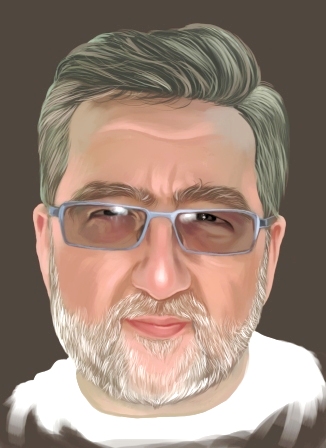 |

Fiachra Lennon is a final-year university student at the National College of Art and Design in Ireland, and has undertaken to write about the pocket-sized war comics such as Commando and Battle Picture Library for his thesis. To this end, he recently conducted the following interview with Dave:
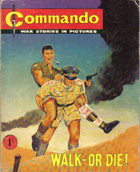
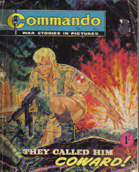
In the interview I've read, you mention the guidelines that were sent to you by Commando, that included some suggestions in relation to the main character. Could I ask you to tell me a bit more about the types of guidelines you were given?
The guidelines were essentially one page which contained a general introduction to Commando, a few pointers on what is and isn't acceptable (excessive violence, torture, cruelty, bad language, etc, being definite no-no's), and a list of themes which have at this late stage been well and truly played out. There was also an example of how to lay out a Commando script.
I notice that your stories seem to focus on lesser-known contributors to war efforts, such as Navajo Indians and Canadian Mounties. Did you feel that these sorts of stories would be more likely to be published, or was it just that that was the way the story came about for you?
I really wanted to offer the editor something fresh -- plus, the fresher or more original the idea, the more enthusiastically I felt that I would write the story. I was already familiar with the Navahos' contribution to the war effort (this was long before the Nicolas Cage movie Windtalkers, incidentally) and I remembered reading something somewhere about the Royal Canadian Mounted Police and their war effort. After that I just kept looking around until I found themes that either hadn't been explored before or that hadn't been used quite so much. As a consequence, I also wrote about the Royal Army Medical Corps, the Texas Rangers, the American Indian wars, the Spanish-American War, American Civil War, stories set in Ancient Rome, stories about the Home Guard, the Napoleonic Wars, the use of camels in the U S Cavalry, KATUSA regiments (Koreans Attached to the United States Army), jungle cops, the Repair and Salvage Units of the R.A.F. If it struck me as being unusual, then I tried to get a story out of it, most often taking some real-life event and then weaving fictional characters into it.
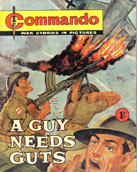
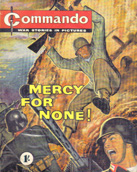
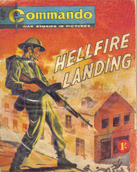
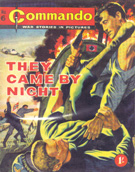
I have a paltry number of Commandos, and haven't had the chance to read many newer ones, so could I ask you from your experience whether you feel that Commando's style has changed much over the years? Also, whether you think Commando has evolved to try to appeal to a contemporary audience?
Commando has definitely tried to evolve to meet the demands of a contemporary audience. Earlier stories were, nine times out of ten, written by men who had served in the forces and seen action in the Second World War, so they were written with considerable authority. In those less-PC times, there was also a greater freedom to show or tell things as they were. The obvious example is that, in the old days, the bad guys were the Germans. Nowadays the bad guys are no longer "Germans", they're "Nazis". For a number of years, Commando only ever featured stories set in the Second World War. The logo always used to read "War Stories in Pictures." Now it reads "For Action and Adventure" and conflicts from all ages are featured. There has also been the introduction of the series -- six or seven issues, spread over a few months, featuring the same characters. Stories nearly always used to be stand-alones. Many stories have introduced science fiction elements or given greater emphasis to technology in order to appeal to a younger and newer audience. There is more humour now, too, a greater visibility of the editor and contributors. I always tried to recreate the feel of the early stories whenever I wrote a script, but that isn't always the case now, and I don't think the stories are always as compelling as they used to be, but that's probably because I am now an old fogey.
How much have you relied on true to life stories for your inspiration?
So far, every story has been inspired by real events. I may just take the basic idea and then put a spin on it to make it more of a challenge, or more thrilling, but every story begins with me scouring the war books to find that one unusual idea. Once I have that, everything else usually falls into place. If it doesn't, but the editor feels that the story has possibilities, he may suggest a few ways in which to tweak the plot a little.
Can you point me towards any issues that are specifically related to actual events during wars?
Ooh, now you're asking! There have been too many. But we shouldn't forget that the "actual events" are never what the story's about. It's about men caught up in conflict with each other, and how they resolve that conflict, set against a backdrop of war. The war itself is always secondary to that basic theme -- of men at loggerheads who eventually come to accept or respect each other. They're not so much war stories as stories about human nature.
Do you feel that Commando was/is useful in promoting certain values, such as bravery, courage, dignity in its readership?
Unquestionably. The central character is never mean-spirited. He always tries to do the right thing. He may be a coward, but he'll overcome that fear if it means saving his comrades. He may in a moment of weakness have done something he shouldn't. But he always regrets it and tries to set things back to rights. Essentially the central character is someone we have to relate to, so he has to be a good example. Courage, loyalty, the importance of friendship -- these are strong themes in Commando, and rightly so.
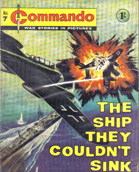
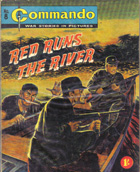
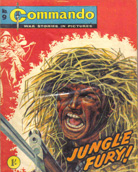
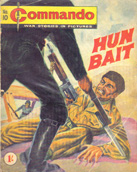
Do you feel that Commando has any relevance today?
Actually, I think it has more relevance now than ever, but unfortunately the magazine doesn't get anywhere near the promotion it needs and deserves in order to bring it to the attention of a wider audience. Its detractors say that it glorifies war, and as such is to be frowned upon. But if only those same detractors would actually read one, they'd see that what Commando actually dishes up is a morality play, and without meaning to sound old-fashioned, I think we really need to re-establish the difference between right and wrong in the eyes of the younger generation, because the lines have become so blurred that no-one even seems to care anymore. Having said that, let's not forget that Commando is first and foremost escapism. It has always been escapism.
What kind of a profile is the classic Commando reader today, do you think? Do you think there are many new readers? And do you feel it neccessary to try to appeal to a new generation?
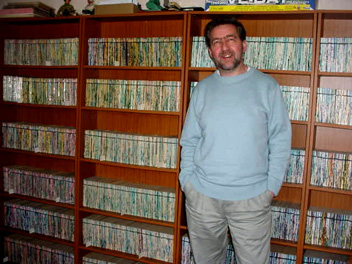
I think the average reader is now an older man like myself, mid-forties to early fifties. Someone who grew up on these stories in the 1960s and still enjoys them. As memory serves, the publisher believes the readership to be around sixteen years of age, although Commando is apparently very popular with soldiers in the armed forces.
Do you find it difficult to continually try to find a new way approach the same subject, war?
No. All it takes is a little imagination. If you think long enough, and hard enough, you can always find a new take on an old theme.
Do you use much by way of reference material?
In those pre-internet days, I used to begin by making a casual search of the books at my local library, until I found a theme that appealed to me. Then I'd get as many books as I could on that subject until I felt that I could write about it with some authority.
Thank you, David.
My pleasure!
 |
 |
 |
 |
I have a paltry number of Commandos, and haven't had the chance to read many newer ones, so could I ask you from your experience whether you feel that Commando's style has changed much over the years? Also, whether you think Commando has evolved to try to appeal to a contemporary audience?
Commando has definitely tried to evolve to meet the demands of a contemporary audience. Earlier stories were, nine times out of ten, written by men who had served in the forces and seen action in the Second World War, so they were written with considerable authority. In those less-PC times, there was also a greater freedom to show or tell things as they were. The obvious example is that, in the old days, the bad guys were the Germans. Nowadays the bad guys are no longer "Germans", they're "Nazis". For a number of years, Commando only ever featured stories set in the Second World War. The logo always used to read "War Stories in Pictures." Now it reads "For Action and Adventure" and conflicts from all ages are featured. There has also been the introduction of the series -- six or seven issues, spread over a few months, featuring the same characters. Stories nearly always used to be stand-alones. Many stories have introduced science fiction elements or given greater emphasis to technology in order to appeal to a younger and newer audience. There is more humour now, too, a greater visibility of the editor and contributors. I always tried to recreate the feel of the early stories whenever I wrote a script, but that isn't always the case now, and I don't think the stories are always as compelling as they used to be, but that's probably because I am now an old fogey.
How much have you relied on true to life stories for your inspiration?
So far, every story has been inspired by real events. I may just take the basic idea and then put a spin on it to make it more of a challenge, or more thrilling, but every story begins with me scouring the war books to find that one unusual idea. Once I have that, everything else usually falls into place. If it doesn't, but the editor feels that the story has possibilities, he may suggest a few ways in which to tweak the plot a little.
Can you point me towards any issues that are specifically related to actual events during wars?
Ooh, now you're asking! There have been too many. But we shouldn't forget that the "actual events" are never what the story's about. It's about men caught up in conflict with each other, and how they resolve that conflict, set against a backdrop of war. The war itself is always secondary to that basic theme -- of men at loggerheads who eventually come to accept or respect each other. They're not so much war stories as stories about human nature.
Do you feel that Commando was/is useful in promoting certain values, such as bravery, courage, dignity in its readership?
Unquestionably. The central character is never mean-spirited. He always tries to do the right thing. He may be a coward, but he'll overcome that fear if it means saving his comrades. He may in a moment of weakness have done something he shouldn't. But he always regrets it and tries to set things back to rights. Essentially the central character is someone we have to relate to, so he has to be a good example. Courage, loyalty, the importance of friendship -- these are strong themes in Commando, and rightly so.




Do you feel that Commando has any relevance today?
Actually, I think it has more relevance now than ever, but unfortunately the magazine doesn't get anywhere near the promotion it needs and deserves in order to bring it to the attention of a wider audience. Its detractors say that it glorifies war, and as such is to be frowned upon. But if only those same detractors would actually read one, they'd see that what Commando actually dishes up is a morality play, and without meaning to sound old-fashioned, I think we really need to re-establish the difference between right and wrong in the eyes of the younger generation, because the lines have become so blurred that no-one even seems to care anymore. Having said that, let's not forget that Commando is first and foremost escapism. It has always been escapism.
What kind of a profile is the classic Commando reader today, do you think? Do you think there are many new readers? And do you feel it neccessary to try to appeal to a new generation?

I think the average reader is now an older man like myself, mid-forties to early fifties. Someone who grew up on these stories in the 1960s and still enjoys them. As memory serves, the publisher believes the readership to be around sixteen years of age, although Commando is apparently very popular with soldiers in the armed forces.
Do you find it difficult to continually try to find a new way approach the same subject, war?
No. All it takes is a little imagination. If you think long enough, and hard enough, you can always find a new take on an old theme.
Do you use much by way of reference material?
In those pre-internet days, I used to begin by making a casual search of the books at my local library, until I found a theme that appealed to me. Then I'd get as many books as I could on that subject until I felt that I could write about it with some authority.
Thank you, David.
My pleasure!
 |
 |
 |
 |
Do you feel that Commando has any relevance today?
Actually, I think it has more relevance now than ever, but unfortunately the magazine doesn't get anywhere near the promotion it needs and deserves in order to bring it to the attention of a wider audience. Its detractors say that it glorifies war, and as such is to be frowned upon. But if only those same detractors would actually read one, they'd see that what Commando actually dishes up is a morality play, and without meaning to sound old-fashioned, I think we really need to re-establish the difference between right and wrong in the eyes of the younger generation, because the lines have become so blurred that no-one even seems to care anymore. Having said that, let's not forget that Commando is first and foremost escapism. It has always been escapism.
What kind of a profile is the classic Commando reader today, do you think? Do you think there are many new readers? And do you feel it neccessary to try to appeal to a new generation?
